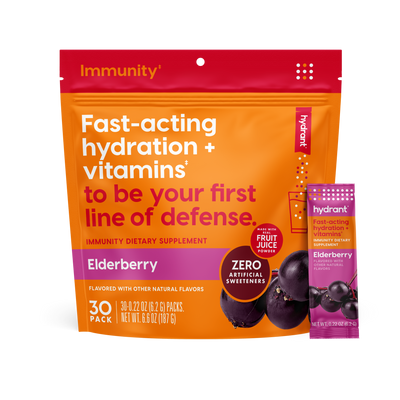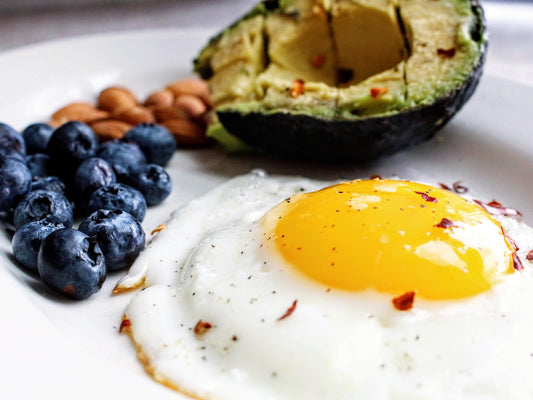A “keto headache” is one of the most common side effects associated with the ketogenic (or keto) diet. If you’ve recently started following a keto approach, you might be experiencing headaches more often than you’d like.

The good news is that you don’t just have to muscle through these headaches while you wait for your body to get into a state of ketosis. Keep reading to find out what causes this unpleasant symptom, as well as what you can do to remedy it and start feeling better faster.
Why Do You Get a Headache on Keto?
There are a few reasons why headaches often occur in those who are following the keto diet (especially those who are new to it). Here are some specific causes associated with an increase in headaches:
Dehydration
When you switch from a typical, high- or moderate-carb diet to a keto diet, it’s likely that you’ll experience dehydration. There are a couple of reasons why dehydration is common among folks who follow the keto diet, including an increase in urination.
When they shift into a state of ketosis (i.e., they’re burning fat for fuel instead of carbohydrates), people tend to urinate more often. This happens because the body is releasing more water than it normally would.
During digestion, carbohydrates are broken down into glucose and then stored in the body in the form of glycogen. Glycogen is bound to water molecules [1]. As your body begins using up those carbs as it shifts into ketosis, the water to which the glycogen is bound will be released in your urine.
You might find yourself making trips to the restroom more frequently in the early days of adopting a keto diet. If you aren’t careful about your rehydration efforts (more on that later), you could also end up dehydrated.
Electrolyte Imbalances
In addition to an increase in urination and reduction in water storage, you are also prone to dehydration when shifting into ketosis because your body is producing less insulin [2]. Insulin is a hormone that helps to shuttle glucose from your blood into the liver and skeletal muscle cells, where it’s stored as glycogen.
Because you’re consuming fewer carbohydrates on a keto diet, your body does not need to produce as much insulin to move carbs from the blood into the liver and muscles. This decrease in insulin can result in a decrease in levels of electrolytes like potassium, sodium, and magnesium.
When electrolyte levels are low, even if you’re drinking a lot of water, you could still end up dehydrated and experiencing headaches (as well as other symptoms like dry mouth, dizziness, muscle cramps, or vision impairments).
Low Blood Sugar
Because your body is not using carbohydrates for fuel when you stick to a ketogenic diet, it’s common to experience low blood sugar levels, along with the symptoms associated with this particular state. Headaches are a well-known side effect of low blood sugar [3]. You might also experience other symptoms like brain fog, fatigue, or shakiness.
Most people have spent their whole lives being fueled by carbohydrates. As a result, when they start following a keto diet, their body is going to be a bit shocked, to say the least, by the sudden change in fuel sources.
It takes a while to adjust to being fat-fueled instead of carbohydrate-fueled. Once their bodies have time to get acclimated, though, many people report actually feeling better than they did when they were eating a high-carb diet.
Increased Stress
The process of switching from being fueled by carbs to being fueled by fat is a stressor on the body. When blood sugar levels drop, the production of cortisol, one of the body’s primary stress hormones, goes up.
The adrenal glands produce cortisol to boost blood sugar and provide additional energy so that you can survive during a difficult situation (or what the brain or body perceives to be a difficult situation) [4].

Elevated cortisol and increased stress can result in increased muscle tension and headaches in some people. These symptoms might also be exacerbated by difficulty sleeping, which some people experience in the early days after switching to a keto diet. Poor sleep can decrease our pain tolerance and make us more sensitive than we might normally be [5].
Luckily, this state of elevated cortisol doesn’t last for most people. After a while, when your body starts to accept its “new normal” it returns to a place of homeostasis and side effects start to go away.
Ways to Combat a Keto Headache
Now that you know more about what contributes to keto headache, you can start addressing the issue at the root and taking steps to reduce this symptom (and potentially stop future headaches from happening).
The following are some tips that will help you to overcome headaches, start experiencing the benefits of the keto diet sooner, and make it a lasting and sustainable way of life:
Stay Hydrated
The first way to minimize the frequency of or combat keto headaches is to make sure you’re drinking enough water. Remember, your body is losing a lot of water as you transition to a fat-fueled life instead of a carb-fueled one.
To make up for these losses, you’ll need to replace the water in your system by increasing your intake.
Try keeping a water bottle close by throughout the day so that it’s easy and convenient for you to take a drink. Make an effort to drink water first thing in the morning, too. This helps to make up for going eight-plus hours in the night without anything to drink while you sleep, and it sets you up to be better-hydrated all day long.
Increase Electrolyte Intake
Upping your water intake is a good first step. For most people, though, it’s not enough just to drink plain water.
If your electrolyte balance is off, your body won’t be able to utilize all the water you’re drinking and it’ll just get excreted. This could actually lead to you being more dehydrated.
To reduce your chances of running into this issue, make sure you’re taking in enough electrolytes, too. There are a few different ways that you can up your electrolyte levels, including the following:
- Add plenty of salt to your food
- Add a pinch of salt and lemon juice to your water
- Eat more electrolyte-rich foods (nuts, avocados, salmon, mushrooms, spinach, dark chocolate, bone broth, etc.)
You can also add pre-made hydration mixes to your water for a flavor boost as well as a healthy dose of electrolytes. Look for drink mixes that have reduced sugar levels or no added sugar, if possible, as ones that contain sugar could kick you out of ketosis depending on the serving size.
Adjust Your Diet
Most people who start a keto diet know that they need to reduce their carbohydrate intake to help them get into a state of ketosis. What they don’t always realize, though, is that they need to increase their intake of the other macronutrients: fat and protein.
Without enough of these macronutrients, you’ll likely find yourself under consuming calories, not just carbohydrates. This can make headaches and other symptoms even worse.
When following a keto diet, most people get around 65-70 percent of their daily calories from fat and at least 20-25 percent of their daily calories from protein. Make sure you’re getting enough of these essential nutrients in your diet to reduce your chances of developing deficiencies and ensure you have enough energy to feel your best.
Exercise
When you’re dealing with a keto headache, exercising might seem like the last thing you want to do. Getting in a workout, though, can help your body to use up its stored carbohydrates and shift into a state of ketosis faster. It can also produce endorphins, which help to provide natural pain relief and boost your mood [6].

Remember, you don’t have to push yourself to the limit in the gym to experience these effects. Going for a walk, doing yoga, or lifting some moderately-heavy weights in your garage. These less intense forms of exercise can help to combat your headache, and can also be good for your overall health. Just remember, if you exercise and sweat, you’ll want to replenish any of those lost electrolytes to stay ahead of dehydration.
Get Enough Sleep
Finally, make sure you’re sleeping enough. It’s important to exercise during this period. However, if you have to choose between some extra zzz’s and the gym, you might want to opt for your bed.
You’ll likely feel more tired when you’re shifting from a traditional diet to a keto diet, and a lack of sleep can exacerbate your symptoms, reduce your pain tolerance, and even make your headaches worse. By getting adequate sleep (perhaps even more than you normally get) each night, you can experience fewer headaches, feel more alert, and get through the transition stage faster.
Takeaways
Dealing with a headache while following a keto diet definitely isn’t a pleasant experience. The suggestions outlined above, though—especially the tips about making proper hydration and electrolyte balance a priority—can potentially help to minimize the severity and frequency of your headaches while you adjust to being in a state of ketosis.














